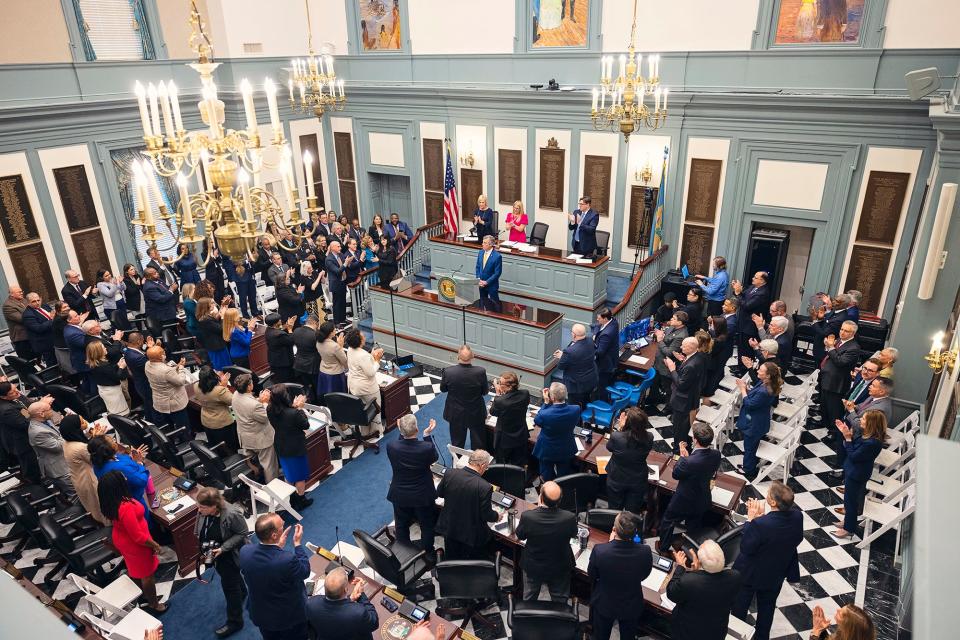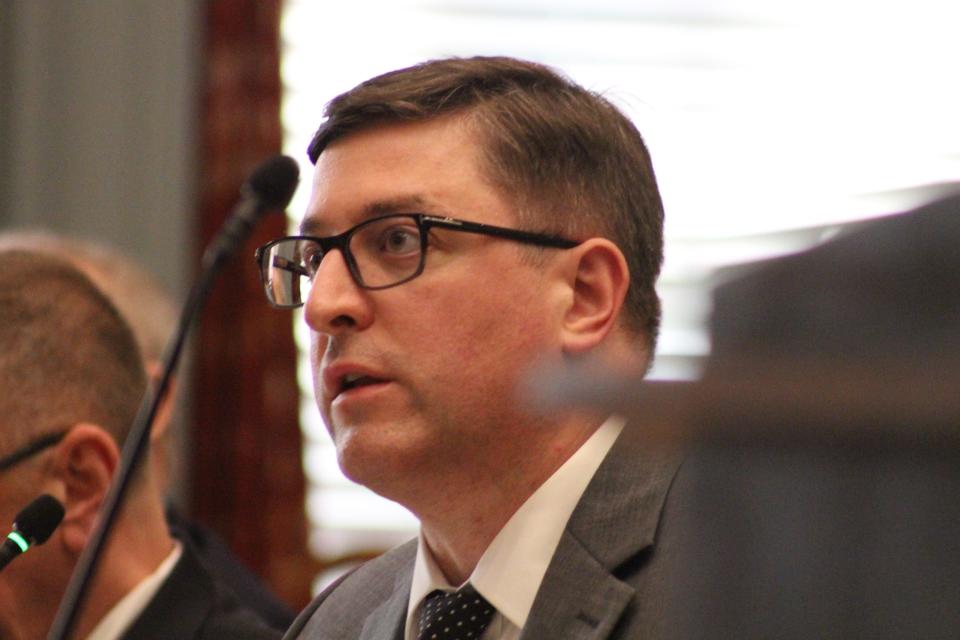Why a $1M pension error won't be addressed by legislators this year
- Oops!Something went wrong.Please try again later.
This story was produced by Spotlight Delaware as part of a partnership with Delaware Online/The News Journal. For more about Spotlight Delaware, visit www.spotlightdelaware.org.
Delaware lawmakers will not hold hearings this legislative session to scrutinize the Carney administration’s surprise, million-dollar decision last winter to revamp the state’s pension system for retired legislators, according to Senate leadership.
In a Monday interview with Spotlight Delaware just ahead of the final days of the legislative year, Senate Majority Leader Bryan Townsend said lawmakers will wait until next year to consider legislation that could revert the pension back to its way of operating prior to the March change.
That change resulted in permanent pay bumps for retired legislators and one-time back-pay distributions of nearly a million dollars.
Townsend’s comments come three months after Spotlight Delaware reported that retired members of the General Assembly were set to receive boosts in their monthly pension payments because of an apparent failure by state officials 27 years earlier to codify a law change into the Delaware legal code.

Prior to 1997, lawmakers’ pension payouts were anchored to that of the highest-earning retired legislator.
In the subsequent years, Delaware’s pension office implemented a more standard system, whereby lawmakers received payments based on a percentage of their own highest years’ earnings.
But, in March, state officials decided to revert the pension back to its pre-1997 format.
That decision – which was only revealed in a letter sent March 4 to former legislators – came after officials within the Carney administration determined that Delaware’s legal code “was never updated” following the 1997 change.
In all, it was a curious and complicated development that prompted questions of how an apparent law change could go into effect, then be repealed three decades later after government officials in the executive branch determined that the law as thought was void.
Unless changed, the development also promises another bump in pay to retired lawmakers at the end of the year with the retirement of the longtime Democratic Rep. Pete Schwartzkopf, who as a former Speaker of the House for a decade would be in line for one of the more significant pensions in recent years.
Following the Spotlight Delaware report in April, Townsend was among several lawmakers who expressed frustration that the Carney administration could unilaterally change an apparently ambiguous policy without alerting the General Assembly.
Townsend had told Delaware Online/The News Journal then that he and his colleagues “want to get to the bottom of how the issue occurred and why legislators weren’t at least given a heads-up.”

But, asked Tuesday why the Senate Democrats have not yet held hearings on the matter, Townsend said he determined that the “decision was made, and there’s no changing it,” under the constraints of a six-month legislative session, which ends this week.
Townsend further contended that a public hearing compelling pension officials to testify would result in “very simplistic answers.” Instead, he said, it is more productive to wait for the state’s official Compensation Commission to issue a report about the legislative pension later this year, then act on those conclusions next year.
“Given that [the Compensation Committee] are about to convene in the coming months, it felt most appropriate to take this approach,” Townsend said.
PREVIOUS REPORTING: Delaware made changes to its lawmaker pension plan 27 years ago. Why they didn't stick
Still, the decision to wait is drawing criticism from at least one retired Republican state legislator, who argued that lawmakers have the responsibility to act on what is fundamentally a policy decision.
In an interview, former Republican State Sen. Greg Lavelle questioned why Democratic leaders in the House and Senate are willing to pass laws on a variety of topics, from electric cars and state employee health care, “but they’re not going to make a decision on this?”
“I don’t understand why they’re chickens about this,” he said.
In response, Townsend reiterated his belief that the Delaware Compensation Commission – which is made up of six appointees who issue salary recommendations for several statewide posts – should be given time to study best practices used by other states’ legislative pensions.
“That should be what drives our decision-making,” Townsend said.
How the error occurred
Coincidentally, it was the Delaware Compensation Commission that sits at the heart of the snafu that prompted the changes to the legislative pension system.
The 1997 law change that altered payouts for retired lawmakers didn’t follow a normal legislative path, whereby the General Assembly considers a bill, passes it, and then the governor signs it into law.
Instead, the change happened after the state’s Compensation Commission made a recommendation that Delaware no longer anchor its retired lawmaker payouts to that of the highest-earning former legislator.
And, because of a quirk in Delaware’s legal code, an official recommendation from a state commission automatically becomes law if it is not rejected by a vote of both houses in the General Assembly.
In 1997, lawmakers did not reject the Compensation Commission’s report about the legislative pensions.
As a result, the change “ultimately became law,” according to the March letter sent to retired lawmakers by Delaware Pension Administrator Joanna Adams.
“But the Delaware Code was never updated,” she said in the letter.
In an email sent in April to Spotlight Delaware, Adams appeared to pull back on the assertion that commission reports can become law.
Though she again noted that the Compensation Commission “had the full force and effect of the law,” she also stated that adding new laws “is solely within the power of the legislature.”
When asked if Adams’ interpretation is correct, Robert Scoglietti, the Delaware Deputy Controller General, pointed to state code that says commission reports do “have the force and effect of law … unless the General Assembly shall by joint resolution reject the report in its entirety.”
Legislative pensions are paid from the Delaware Public Employees Retirement System, an office that manages and invests worker contributions from across the state government. That means a lump sum payment to retired legislators would not hit taxpayers, but would draw down investable funds for other state pensioners. As of June 2023, the state’s various pension funds held more than $12 billion.
Spotlight Delaware has filed a Freedom of Information Act (FOIA) request seeking any emails sent by the Delaware Pension Office that discuss the decision to change payout to retired lawmakers.
The pension office denied the FOIA request earlier this month, and Spotlight Delaware has appealed the denial.
Get stories like this delivered to your email inbox by signing up for the free newsletter at spotlightdelaware.org/subscribe.
This article originally appeared on Delaware News Journal: Delaware legislators won’t address $1M pension error this year

